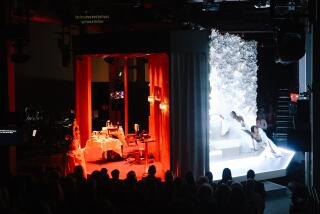Fedora Barbieri, 82; Mezzo-Soprano Performed 109 Roles
- Share via
Fedora Barbieri, whose big, rich, dramatic mezzo-soprano complemented the voices of such titans as Maria Callas, Jussi Bjorling and Cesare Siepi, died Tuesday in Florence, Italy. She was 82.
Her Metropolitan Opera debut in 1950 -- as Eboli in a new production of Verdi’s “Don Carlos” on the opening night of Sir Rudolf Bing’s regime -- almost didn’t take place. The Immigration and Naturalization Service had sequestered shiploads of arriving foreigners on Ellis Island on the grounds that they could be threats to the United States. Barbieri, Boris Christoff and Zinka Milanov were among them.
Barbieri’s offense was having attended a Fascist school in wartime Italy (all Italian schools at that time were run by the government), which she acknowledged in her visa application. Barbieri and the other soloists were released just in time to make it to the theater.
Of that performance, Olin Downes of the New York Times wrote that she was “a superb mezzo from Italy, with a kindling dramatic temperament.”
Barbieri was born in 1920 in Trieste, Italy. She made her operatic debut in 1940 as Fidalma in Cimarosa’s “The Secret Marriage” at the Teatro Comunale in Florence. She first sang at La Scala in 1943, and began appearing there regularly in 1946. She sang at the Met from 1950-54, 1956-57 and 1967-68.
On her return to the New York house as Mistress Quickly in Verdi’s “Falstaff” in 1967, Donal Henahan in the New York Times hailed “that adorable foghorn of a voice.” Her farewell there took place on Feb. 26, 1977, as the Princess in Puccini’s “Suor Angelica” and Zita in his “Gianni Schicchi.”
Her repertory, which slowly inclined to the lower-lying registers of Azucena in Verdi’s “Il Trovatore” and Amneris in his “Aida,” and finally to Quickly in “Falstaff,” included 109 roles. Altogether at the Met, she sang 95 performances of 11 roles in 10 seasons.
Her only real vocal rival was Giulietta Simionato. The two can be found trading insults in separate interviews for the Bel Canto Society (www.belcantosociety.org).
Barbieri left a significant recorded legacy, including multiple versions of “Aida,” “Un Ballo in Maschera,” “Don Carlos” and “Falstaff,” among other Verdi operas, as well as such works as Mascagni’s “Cavalleria Rusticana” and Cherubini’s “Medee.”
She was married to Luigi Barlozzetti, a music director who managed her career. He died in 1986. She is survived by sons Ugo and Franco, both of Florence.
More to Read
The biggest entertainment stories
Get our big stories about Hollywood, film, television, music, arts, culture and more right in your inbox as soon as they publish.
You may occasionally receive promotional content from the Los Angeles Times.










